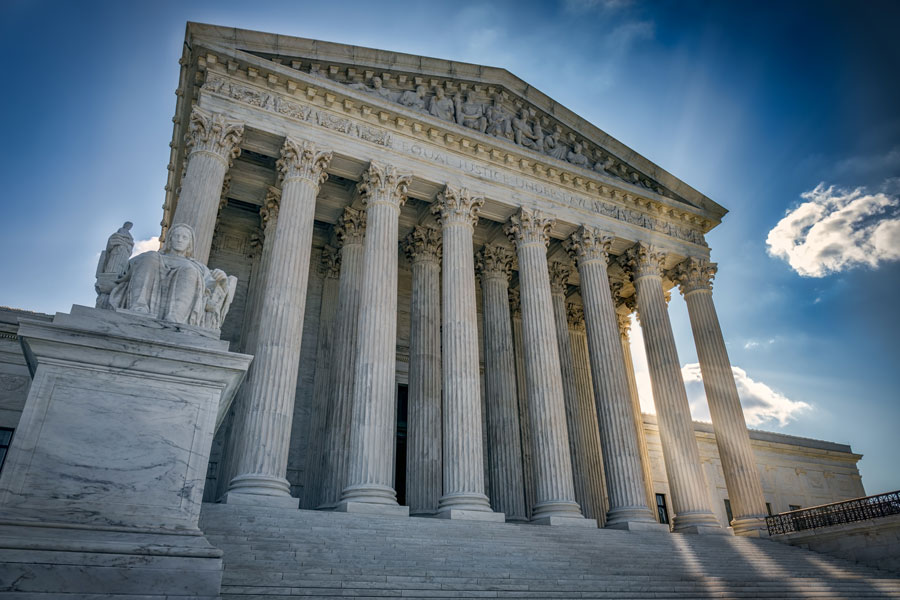RENO, Nev. — The U.S. Supreme Court on Monday refused a rural Nevada church’s request to enter a legal battle over the government’s authority to limit the size of religious gatherings amid the COVID-19 pandemic — after the church won an appeals court ruling last month that found Nevada’s restrictions unconstitutional.
Attorneys general from 19 other states had recently joined in support of the unusual request from Calvary Chapel Dayton Valley east of Reno.
They were urging the Supreme Court to rule on the merits of the Nevada case to help bring uniformity to various standards courts across the country have used to balance the interests of public safety and freedom of religion.
The church’s lawyers said in a court filing last Thursday they wanted the high court to “clarify for all that the First Amendment does not allow government officials to use COVID-19 as an excuse to treat churches and their worshippers worse than secular establishments and their patrons.”
In a 5-4 decision in June, the Supreme Court refused Calvary Chapel’s request for an emergency injunction blocking enforcement of Nevada’s attendance limit at houses of worship.
But the 9th Circuit Court of Appeals in San Francisco ruled in favor of the church last month, finding it was unconstitutional for Nevada to treat casinos and other businesses more favorably than churches.
The church’s latest plea for relief from the Supreme Court was in the form of a petition for a review of the case on its merits. Such petitions are rare and their approval is even rarer, even though they require approval by only four justices.
The justices denied the request without explanation on Monday.
The 9th Circuit ruling sent the case back to the district court to determine how to proceed but in the meantime prevented the state from enforcing any church attendance limit more stringent than the current 25% of capacity limit on most businesses.
Judge Richard Boulware put the case on hold pending the Supreme Court’s ruling on the church’s petition. He instructed lawyers on both sides to provide an update on the status of any future filings planned within seven days of such a ruling.
Nevada Attorney General Aaron Ford had argued the justices should let the federal court in Reno sort out the details before taking the extraordinary step of wading into the case.
He said the facts are different in each of the cases the Supreme Court and several appellate panels have heard regarding limits on businesses, religious and other public gatherings.
Ford wrote in court documents submitted last week the case “is a poor vehicle for addressing questions beyond those the Ninth Circuit already resolved in Calvary’s favor.”
Ashley Forest, a spokeswoman for Ford’s office, said in an email on Monday that “while the Supreme Court won’t hear the church’s COVID case regarding attendance limits, Nevada heard the 9th Circuit clearly and appreciates the guidance on how best to protect this constitutional right.”
Lawyers for the church said Monday in an email that they were preparing a response.
Indoor religious gatherings in Nevada most recently had been subject to a hard cap of 50 churchgoers while attendance limits at many businesses including casinos were based on a percentage of the buildings’ fire-code capacities.
Nevada currently imposes the 25% occupancy limit on all gathering places — including casinos, restaurants, bars, amusement and theme parks, gyms and fitness facilities and movie theaters.
The church’s latest court filings argued that an attendance limit of 25% for houses of worship is prohibited under the First Amendment. It wants to be treated the same as essential businesses — like manufacturing facilities and professional offices, which currently have no capacity limits other than social distancing.
Kentucky’s attorney general filed a friend of the court brief last month backing the Nevada church’s request to the justices. It was joined by attorneys general from Alaska, Arizona, Arkansas, Georgia, Idaho, Kansas, Louisiana, Mississippi, Montana, Nebraska, Ohio, Oklahoma, South Carolina, South Dakota, Tennessee, Texas, Utah and West Virginia.
